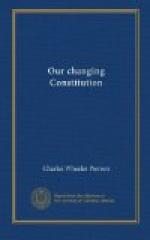[Footnote 1: The Act of Jan. 28, 1915, took away this right in the case of railroad companies incorporated under federal charter (38 Stat. 804).]
The scheme of federal incorporation presents some constitutional questions. As pointed out in a previous chapter, the Constitution nowhere expressly confers on Congress the right to grant corporate charters. Under Chief Justice Marshall’s doctrine of “Implied Powers,” however, it has become well settled that Congress has implied power to charter a corporation whenever that is an appropriate means of exercising one of the powers expressly conferred, for example, the power to regulate interstate commerce. The most serious constitutional question appears to be whether Congress can authorize such a corporation to manufacture, the process of manufacturing not being an activity of an interstate character. In any event, the difficulty could be surmounted by a constitutional amendment. In these days of facile amendment such a thing seems quite within the range of possibility.
The scheme of federal incorporation is by no means new. In the Convention of 1787 which framed the Constitution, Mr. Madison advocated giving Congress the power to grant charters of incorporation. The proposition, however, did not find favor, Mr. King suggesting that it might foster the creation of mercantile monopolies.[1]
[Footnote 1: See Farrand, “Records of the Federal Convention,” Vol. II, pp. 615-616, 620.]
This objection would scarcely be urged to-day, when the country-wide operations of the so-called “trusts” have given them a national character and made their control by federal power a practical necessity.
XIII
WHAT OF THE FUTURE?
In the preceding pages we have observed from various viewpoints the impressive phenomenon of federal encroachment upon state power. It must have become obvious to the most casual reader that the tide is running swiftly and has already carried far. Hamilton was mistaken when he predicted in the Federalist[1] that the National Government would never encroach upon the state authorities.
[Footnote 1: Federalist, Numbers XVII, XXXI.]
What then of the future? Is the Constitution hopelessly out of date? Are the states to be submerged and virtually obliterated in the drift toward centralization? No thoughtful patriot can view such a possibility without the gravest misgivings. The integrity of the states was a cardinal principle of our governmental scheme. Abandon that and we are adrift from the moorings which to the minds of statesmen of past generations constituted the safety of the republic.
No mere appeal to precedents and governmental theory will check the current. The Americans are a practical people, moving forward with conscious power toward the attainment of their aims, along the lines which seem to them most direct. They are more interested in results than in methods or theories. Experience has demonstrated that federal control often spells uniformity and efficiency where state control had meant divisions and weakness. They favor federal control because it gets results.




